Religion
How to Found and Enhance a Religion
"I believe in the fundamental truth of all great religions of the world. - Mahatma Gandhi
How to Found and Enhance a Religion
"I believe in the fundamental truth of all great religions of the world. - Mahatma Gandhi
Introduction
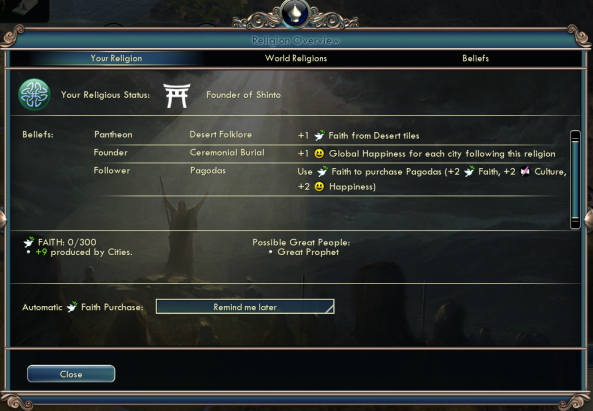
Your Religion screen
Other articles in this series provide an overview of the religion system (including what faith is, how to generate faith and how to found a pantheon), detailed reviews of the many available pantheon, founder, follower and enhancer beliefs, and advice about how to spread and defend your religion.

Great Prophet
Key Concepts
- Faith
 - a new type of currency or yield that is central to the religion system. For an overview of faith and how to generate it, see "How Does the Religion System Work?"
- a new type of currency or yield that is central to the religion system. For an overview of faith and how to generate it, see "How Does the Religion System Work?"
- Belief - the core element of any pantheon or religion, providing specific benefits depending on circumstances
- Pantheon - a pre-religion belief that is absorbed into (and superseded by) a religion. For an overview of pantheons and how to found them, see "How Does the Religion System Work?" and Pantheon Beliefs.
- Religion - a set of beliefs, consisting of a pantheon belief, a founder belief, two follower beliefs, and an enhancer belief. Establishing a religion includes two major steps: founding the religion and enhancing the religion.
- Founding a Religion - using a Great Prophet to select a founder belief, a follower belief, and a name and symbol for the religion
- Enhancing a Religion - using a Great Prophet to select a second follower belief and an enhancer belief
- Great Prophet - a new type of Great Person that can be used to found or enhance a religion, to spread a religion or to create a Holy Site (a new form of tile improvement that has a base yield of 6 faith)
Before you decide to pursue a religion, you should consider whether doing so will help you achieve your ambitions for the game. Founding and enhancing (and later defending) your religion require investments of time (turns), hammers and gold--all of which are in short supply in any game. Pursuing a religion (or diverting resources to make a religion more effective or powerful) is a strategic choice--meaning you are choosing not to pursue other paths, such as:
- Choosing to build shrines and temples means you are choosing not to build (or are choosing to defer building) a granary, archer or second scout;
- Choosing to build a religious World Wonder, like Stonehenge or Hagia Sophia, means you may lose the opportunity to build other wonders, like the Great Library or the Oracle;
- Gold gifted to a religious City State to get early faith cannot be used to buy a worker or settler or to befriend a maritime City State for food to help your capital grow; and
- Choosing to settle your second city near a faith-generating Natural Wonder means you must defer settling a city in a potentially more attractive location.
There is a limit on the number of religions that can be founded in a game, so founding a religion is a race. Also, each pantheon, founder, follower and enhancer belief can only be taken once, so there is also is a race for your desired beliefs. Certain civilizations have substantial advantages in the religion race. The Mayans and Ethiopians have Unique Buildings that provide early game faith-generation advantages--the Ethiopian stele (monument replacement) provides 2 faith in addition to the typical 2 culture and the Mayan pyramid (shrine replacement) provides 2 faith and 2 science. The Celtic Unique Ability will generate 1 faith from an unimproved forest tile that is immediately adjacent to the city center (2 faith, if there are three adjacent unimproved forest tiles). Although Byzantium has no special advantage in generating faith, it is entitled to one additional bonus belief when it founds its religion -- which can be any belief (pantheon, founder, follower or enhancer).
If you are playing as one of these civilizations, you have a religious advantage and usually should explore founding a religion. On the other hand, if one or more of these civilizations are your close neighbors, you may have great difficulty founding an early religion and defending that religion from their religious spread.
Choosing not to found a religion does not mean that you should ignore religion and faith altogether. Obtaining a pantheon belief can be helpful in the early game (in fact, for the entire game if no other religion spreads to your cities). Allowing another religion into your cities can also be beneficial. Although the founder of that religion will receive founder benefits, that religion's pantheon and follower beliefs may be sufficiently attractive to justify embracing that religion, and you will receive a modest diplomatic benefit with the founder of that religion. Once the religion becomes the majority religion in one of your cities, you can purchase a Missionary with faith in that city and use the Missionary to spread that religion to your other cities. Once you have a religion (any religion) in one or more of your cities, you can, once you enter the Industrial era, purchase Great Persons with faith in those cities.
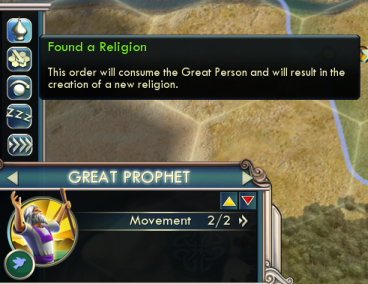
Founding a religion
Assuming you want to found a religion, how do you do that?
To found and enhance your religion, you will need two Great Prophets -- the first will be expended to found your religion (when you select your founder belief and one follower belief) and the second will be expended to enhance your religion (when you select one additional follower belief and an enhancer belief).
Only a Great Prophet can found or enhance a religion, and there are only four ways to generate a Great Prophet:
- With accumulated faith
- By completing The Hagia Sophia
- By selecting a Great Prophet as your free Great Person with the Liberty policy tree finisher or the Leaning Tower of Pisa
- If you are playing the Mayans, by selecting a Great Prophet as one of your long-count Great Persons after you research Theology
You should also be able to found or enhance your religion with another civilization's Great Prophet that you have captured, so long as the Great Prophet still has 4 or more conversion spread uses left.
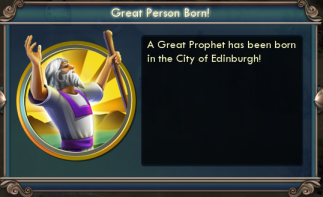
A Great Prophet is Born
The most common method of generating a Great Prophet is with accumulated faith. Prior to the Industrial Era, Great Prophets cannot be manually purchased with faith. Instead, they are randomly generated after you cross various faith accumulation thresholds -- the first Great Prophet after you accumulate 200 faith, the second after 300 faith, the third after 500 faith, the fourth after 800 faith, the fifth after 1200 faith, etc.
Randomly generated means just that -- you might not spawn a Great Prophet on the turn you cross the relevant faith accumulation threshold (200 faith, 300 faith, etc.). In fact, a Great Prophet might not spawn for several turns after crossing the relevant threshold (but rarely more than 5 or so turns). And, when the Great Prophet does spawn, the amount of accumulated faith is reset to 0 and any "excess" faith (faith accumulated above the relevant threshold) is eliminated.
Although your chances of spawning a Great Prophet rise slightly as you generate more faith above the threshold, the excess faith will evaporate when your Great Prophet spawns. You can safely suspend any special efforts to generate Faith once you pass the relevant faith accumulation threshold without meaningfully affecting your chances of spawning a Great Prophet on subsequent turns. If you are generating faith only from buildings (such as shrines, temples and/or Stonehenge) or from religious City State gifts, you won't be able to do anything about the wasted excess faith. If, on the other hand, you are working specific tiles for the primary purpose of capturing those tiles' faith yield, you can reallocate your citizens to work more attractive tiles until your Great Prophet spawns. For example, if you have assigned a citizen to work a religious Natural Wonder tile that yields 6 faith per turn and no food, you can reassign that citizen to work a more attractive tile once you accumulate more faith than the required threshold.
Once you enter the Industrial Era, Great Prophets will no longer be randomly generated and you will be able to buy Great Prophets and other Great Persons with faith.

The Hagia Sophia

Leaning Tower of Pisa
Once you research Theology, you can build The Hagia Sophia, which yields 3 faith per turn, 1 culture per turn, and 1 Great Artist point, provides a free Temple and, most importantly, provides a free Great Prophet. Assuming there is at least one religion that can still be founded, the Great Prophet from Hagia Sophia can found a religion (or enhance an existing religion). If you have not founded a pantheon, you will have the opportunity to select a pantheon belief, in addition to a founder belief and follower belief, at the time of founding.
If you select a Great Prophet with the Liberty social policy finisher or as your free Great Person from the Leaning Tower of Pisa (which you can build after researching Printing Press), that Great Prophet can found or enhance your religion in the same manner as the Great Prophet from Hagia Sophia. Similarly, if you are playing as the Mayans and select a Great Prophet as one of your long-count Great Persons, it too can found or enhance your religion in the same manner.
If you plan to use the Liberty finisher to obtain a Great Prophet, and if Hagia Sophia is still available, you might consider whether it would be more advantageous to obtain a Great Engineer with the Liberty finisher and use the Great Engineer to rush-build Hagia Sophia, which would give you both the Great Prophet and a free temple, 3 faith, 1 culture and 1 Great Artist point -- arguably a better return on your Liberty finisher. However, the Great Engineer will increase by 100 the cost of future Great Artists, Great Engineers, Great Merchants and Great Scientists, which may disrupt your other Great Person goals for the game.
There are some cautions that you should consider before you plan to rely on using Hagia Sophia, the Leaning Tower, the Liberty finisher or the Mayan Long-Count to found a religion.
- First, there must still be at least one religion that can be founded. For a given map size (dual, tiny, small, standard, large and huge), the number of permitted religions is one more than half of the default number of civilizations for that map size (i.e., 5 religions on a standard map with 8 civilizations, 7 religions on a huge map with 12 civilizations, etc.). Adding more AIs at game setup does not increase the number of religions that can be founded. If the maximum number of religions have been founded, you will not be able to found a religion. As you play on higher levels of difficulty, the AI gets increasingly aggressive about early founding of religions.
- Second, even if one or more religions can still be founded, the remaining beliefs from which you can choose may not help you achieve your desired strategic goals. If the remaining beliefs are sufficiently unattractive, you may be better off accepting another civilization's religion that has attractive follower beliefs and use your Great Prophet to create a Holy Site to generate faith (6 faith base yield) for post-Industrial Era purchases of other Great Persons.
Using a Great Prophet to found a religion
When you expend a Great Prophet to found your religion, you will have the following options:
- Select your religion's symbol
- Edit your religion's name
- Select a founder belief
- Select your first follower belief and
- If you haven't already chosen a pantheon belief, select a pantheon belief. Any pantheon belief that you selected when you founded your pantheon will be absorbed into your religion at founding and become essentially an additional follower belief. You cannot change your prior pantheon belief.
Before making your belief selections, you can see which religions have taken particular beliefs by checking the "Beliefs" tab in "Religion Overview."
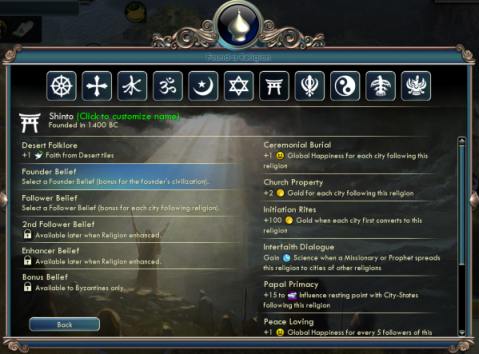
Selecting a founder belief
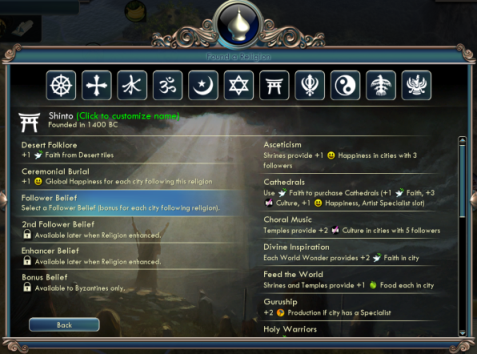
Selecting a follower belief
Founder beliefs
There are 9 founder beliefs, providing happiness, gold, science, faith, culture or CS influence:
Follower beliefs
When you found your religion you will take one follower belief, and you will take another when you enhance your religion. There are 16 follower beliefs, allowing you or any other civilization with a city that has a majority of its population following your religion to buy religious buildings or pre-Industrial land units, receive boosts in the yields from other buildings (like shrines, temples and gardens), or enjoy food, growth or production benefits:
There are 9 founder beliefs, providing happiness, gold, science, faith, culture or CS influence:
- Ceremonial Burial: +1 Happiness for each City following Religion
- Church Property: +2 Gold for each City following Religion
- Initiation Rites: +100 Gold when each City first converts to this Religion
- Interfaith Dialogue: Gain Science when a Missionary or Great Prophet spreads this religion to cities of other religions
- Papal Primacy: +15 to Influence resting point with City-States following this religion
- Peace Loving: +1 Happiness for every 5 followers of this religion in non-enemy foreign cities
- Pilgrimage: +2 Faith for each foreign city following this religion
- Tithe: +1 Gold for every 4 followers of this religion
- World Church: +1 Culture for every 5 followers of this religion in other civilizations
Follower beliefs
When you found your religion you will take one follower belief, and you will take another when you enhance your religion. There are 16 follower beliefs, allowing you or any other civilization with a city that has a majority of its population following your religion to buy religious buildings or pre-Industrial land units, receive boosts in the yields from other buildings (like shrines, temples and gardens), or enjoy food, growth or production benefits:
- Asceticism: Shrines provide +1 Happiness in Cities with 3 followers
- Cathedrals: Use Faith to purchase Cathedrals (+1 Faith, +3 Culture, +1 Happiness, Artist Specialist slot)
- Choral Music: Temples provide +2 Culture in Cities with 5 followers
- Divine Inspiration: Each World Wonder provides +2 Faith in city
- Feed the World: Shrines and Temples provide +1 Food each in city
- Guruship: +2 Production if city has a Specialist
- Holy Warriors: Use Faith to purchase pre-Industrial land units
- Liturgical Drama: Amphitheaters provide +1 Faith in cities with 3 followers
- Monasteries: Use Faith to purchase Monasteries (+2 Faith, +2 Culture, more with Wine or Incense)
- Mosques: Use Faith to purchase Mosques (+3 Faith, +2 Culture, +1 Happiness)
- Pagodas: Use Faith to purchase Pagodas (+2 Faith, +2 Culture, +2 Happiness)
- Peace Gardens: Gardens provide +2 Happiness in city
- Religious Art: Hermitage provides +8 Culture in city
- Religious Center: Temples provide +2 Happiness in cities with 5 followers
- Religious Community: +1% Production for each follower (max +15%)
- Swords into Plowshares: 15% faster Growth rate for city if not at war
Using a Great Prophet to enhance a religion
You enhance your religion in substantially the same manner as you founded your religion. Only a Great Prophet can enhance your religion and the Great Prophet must be located in your Holy City. When you expend a Great Prophet to enhance your religion, you will select one additional follower belief and one enhancer belief. You cannot change any of your earlier pantheon, founder or follower belief selections, but you can edit your religion's name when you enhance.
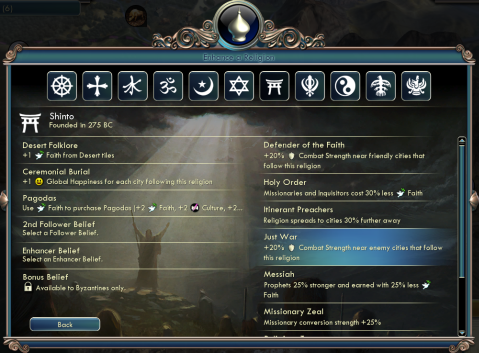
Selecting an enhancer belief
Enhancer beliefs
There are 9 enhancer beliefs, which are intended to facilitate the spread of your religion or to provide other benefits from spread of your religion:
There are 9 enhancer beliefs, which are intended to facilitate the spread of your religion or to provide other benefits from spread of your religion:
- Defender of the Faith: +20% Combat near friendly Cities that follow this Religion
- Holy Order: Missionaries and Inquisitors cost 30% less Faith
- Itinerant Preachers: Religion spreads to cities 30% further away
- Just War: +20% Combat near enemy Cities that follow this Religion
- Messiah: Prophets 25% stronger and earned with 25% less Faith
- Missionary Zeal: Missionary conversion strength +25%
- Religious Texts: Religion spreads 34% faster (68% with Printing Press)
- Religious Unity: Religion spreads to friendly city-states at double rate
- Reliquary: Gain 50 Faith each time a Great Person is expended
Conclusion
Deciding whether to pursue a religion is an important strategic decision that should be thoughtfully considered. There are a number of viable paths to founding and enhancing your religion, and careful thought should be given to what package of beliefs will best suit your needs.
